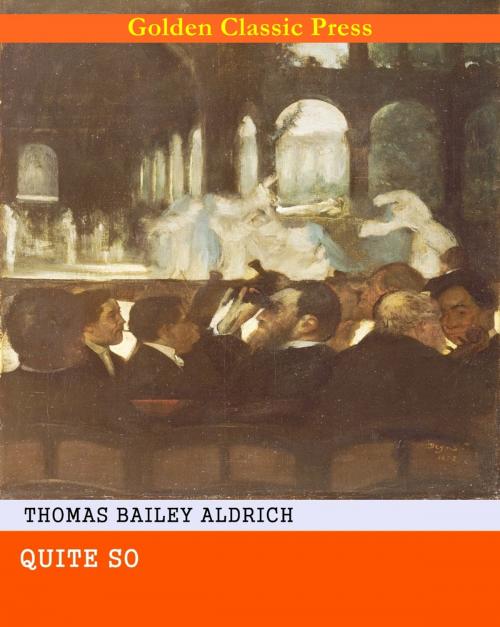| Author: | Thomas Bailey Aldrich | ISBN: | 1230002954684 |
| Publisher: | GOLDEN CLASSIC PRESS | Publication: | November 30, 2018 |
| Imprint: | Language: | English |
| Author: | Thomas Bailey Aldrich |
| ISBN: | 1230002954684 |
| Publisher: | GOLDEN CLASSIC PRESS |
| Publication: | November 30, 2018 |
| Imprint: | |
| Language: | English |
*** Original and Unabridged Content. Made available by GOLDEN CLASSIC PRESS***
Synopsis:
Thomas Bailey Aldrich, (born Nov. 11, 1836, Portsmouth, N.H., U.S.—died March 19, 1907, Boston), poet, short-story writer, and editor whose use of the surprise ending influenced the development of the short story. He drew upon his childhood experiences in New Hampshire in his popular classic The Story of a Bad Boy (1870).
Aldrich left school at 13 to work as a merchant’s clerk in New York City and soon began to contribute to various newspapers and magazines. After publication of his first book of verse, The Bells (1855), he became junior literary critic on the New York Evening Mirror and later subeditor of the Home Journal. From 1881 to 1890 he was editor of The Atlantic Monthly.
His poems, which reflect the cultural atmosphere of New England and his frequent European tours, were published in such volumes as Cloth of Gold (1874), Flower and Thorn (1877), Mercedes and Later Lyrics (1884), and Windham Towers (1890).
His best known prose is Marjorie Daw and Other People (1873), a collection of short stories.
*** Original and Unabridged Content. Made available by GOLDEN CLASSIC PRESS***
Synopsis:
Thomas Bailey Aldrich, (born Nov. 11, 1836, Portsmouth, N.H., U.S.—died March 19, 1907, Boston), poet, short-story writer, and editor whose use of the surprise ending influenced the development of the short story. He drew upon his childhood experiences in New Hampshire in his popular classic The Story of a Bad Boy (1870).
Aldrich left school at 13 to work as a merchant’s clerk in New York City and soon began to contribute to various newspapers and magazines. After publication of his first book of verse, The Bells (1855), he became junior literary critic on the New York Evening Mirror and later subeditor of the Home Journal. From 1881 to 1890 he was editor of The Atlantic Monthly.
His poems, which reflect the cultural atmosphere of New England and his frequent European tours, were published in such volumes as Cloth of Gold (1874), Flower and Thorn (1877), Mercedes and Later Lyrics (1884), and Windham Towers (1890).
His best known prose is Marjorie Daw and Other People (1873), a collection of short stories.















